While the main focus of this report is the prevalence and impact of specific harassing behaviors, the phenomenon of online harassment takes place within a broader context of negative experiences. This chapter documents three other categories of invasive or inappropriate behaviors people might encounter online: nonconsensual sexual imagery, untrue information and “emergent” forms of invasive and targeted abuse. Each of these topics has garnered a great deal of media attention and sparked conversations about the relative trade-offs of privacy and reputation online. For instance, high-profile incidents of nonconsensual sexual imagery have made headlines for featuring private photos of celebrities (or in a recent instance, members of the military) and testing the legal limits of state and federal law. But this survey finds that it is remarkably common for everyday people to encounter nonconsensual sexual imagery online.
Similarly, the spread of untrue information online was widely covered in the 2016 presidential campaign, which introduced both the broad phenomenon of “fake news” and striking examples of misinformation, such as “Pizzagate,” in which a Washington, D.C., pizza restaurant was falsely accused of harboring a child sex trafficking ring linked to Hillary Clinton. Most incidents of false information online do not command national attention, but many Americans have had problems as a result of untrue statements being posted about them.
Finally, some forms of abuse take advantage of digital vulnerabilities. Tactics like hacking or doxing exploit potential security weaknesses to obtain or publish personal information. Trolling and swatting are designed to overwhelm – the former by manipulating someone’s emotions or reactions, and the latter by calling in fake emergencies so authorities will unexpectedly arrive at someone’s house or other location. While many Americans are not aware of these behaviors, they have all been used to escalate abuse online.
Roughly three-in-ten Americans – and just over half of young women – have had explicit images sent to them without their consent
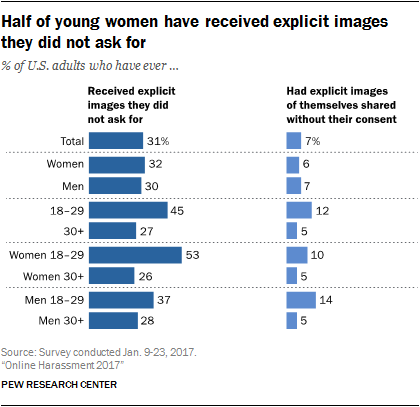
New forms of digital communications have made it easier to share explicit images in a way that bypasses consent. Two questions in this survey gauge the extent to which Americans encounter this type of nonconsensual content: if they have ever had explicit images sent to them that they did not ask for, or if they ever had explicit images of themselves shared online without their consent.
Overall, 31% of Americans say that someone has sent them explicit images that they did not ask for, while 7% say that someone has shared explicit images of them without their permission.
Nearly half of younger Americans (45%) say they have received explicit images they did not ask for, although this experience is not uncommon among older adults either: One-in-five Americans ages 65 and older (20%) have also received this type of unwanted content. Overall, men (30%) and women (32%) are about equally likely to have had someone send them explicit images they did not ask for. But young women in particular encounter this behavior at exceptionally high rates. About half (53%) of women ages 18 to 29 have had someone send them explicit content without their consent, significantly higher than the share of similarly aged men (37%), older men (28%) or older women (26%) who have had this experience.
In their own words: Explicit imagery online
“Men trolling a friend’s sites by sending d**k pics through Messenger. Then when they didn’t reply the guy stalked them for a year online, commenting, sending more and more private and public messages. It was crazy. She had to block him on a number of occasions and at least once he made a new page with a semi-different spelling to his name.”
“Particularly with my female friends, there is a large amount of sexual harassment thrown at their online presences. Sometimes it’s lewd comments on a Facebook photo (even though the commenter is publicly visible), but the worst are on sites like Reddit where users are fully anonymous and they find out about my friends’ gender and begin sending harassing messages or sending lewd pictures.”
“Someone shared explicit photos of a friend of mine without her consent.”
“Revenge porn posted by daughter’s ex-boyfriend.”
“My sister’s ex-husband posted revenge porn. As a way to retaliate.”
“Someone posted explicit pictures of me without my permission on a ‘revenge girlfriend’ website.”
Meanwhile, young adults of both genders are more likely than adults ages 30 and older to have had explicit images of them shared without their consent (12% vs. 5%).
These experiences often go hand-in-hand with the other types of harassing behaviors discussed elsewhere in this report. Among those who have experienced severe forms of online harassment (such as physical threats, stalking, sexual harassment or sustained harassment), 63% have received unwanted explicit images, while 21% have had explicit images of themselves shared without their consent.
One-in-four Americans have had false information about them posted online
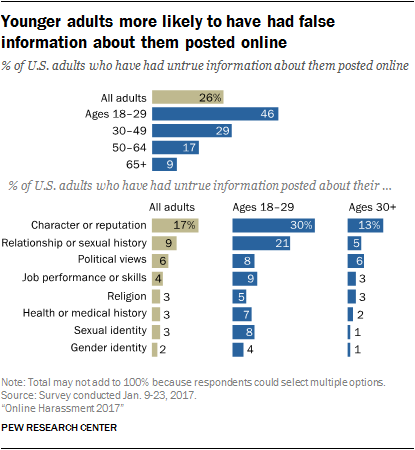
Roughly one-quarter of Americans (26%) say that someone has posted something untrue about them online. The most common type of untrue statement involves people’s personal character or reputation: 17% of Americans say that this type of untrue information about them has been posted online. In addition, roughly one-in-ten Americans say that someone posted something untrue about their relationship or sexual history (9%), while others indicate that someone has posted something untrue related to their political views (6%), job performance (4%), religion (3%), medical history (3%), sexual identity (3%) or gender identity (2%).
This experience is especially common among younger adults: 46% of 18- to 29-year-olds say someone has posted something about them online that was not true. At the same time, 29% of 30- to 49-year-olds have had this happen to them, as have 17% of those ages 50 to 64 and 9% of Americans 65 and older.
In terms of specific types of untrue content, younger adults are more than twice as likely as those ages 30 and older to say someone has posted untrue statements relating to their character or reputation (30% vs. 13%) or their relationship or sexual history (21% vs. 5%).
Overall, there are relatively modest gender differences on this issue. Similar shares of men (28%) and women (23%) say someone has posted something untrue about them online, and men and women tend to experience specific types of untrue content at largely comparable levels. However, a notable minority of young men report that others have posted certain types of untrue content about them. For instance, 11% of men ages 18 to 29 say that someone has posted false information online pertaining to their sexual identity (compared with 4% of similarly aged women and 2% of women as a whole). And 7% of these younger men say someone has posted something untrue about their gender identity (compared with 2% among younger women and just 1% of all women).
Having something untrue about oneself posted online might not be considered “online harassment” in a strict sense, but there is often a great deal of overlap between this issue and the other types of harassing behavior discussed elsewhere in this report. About half (51%) of those who have experienced any type of online harassment – including 61% of those who have experienced severe forms of harassment – also say that someone has posted untrue things about them online. By contrast, only 8% of those who have not experienced any type of online harassment indicate that someone has posted something about them online that was not true.
In their own words: Untrue information
“Someone said I lied about my degree. I was a poser. My husband of two months questioned me. Even my mother, who did not actually get to attend my graduation, questioned me. This person weaved a pretty convincing story.”
“I had to take back my business that I was selling to a couple and when they finally had to give it up, they spread rumors that I had been in jail for stealing and I was a meth head and selling drugs on the streets. Then they confiscated my Facebook and posted humiliating things that were going on in my business and that I was hiring some very offensive people to work in my school. And it kept up for about 6-8 months. They finally were run out of town … But they stole a credit card from the business and went on a very large spending spree before letting it go!!!!!”
“I have seen friends who had a disagreement spread lies and personal stories of one another.”
“A friend was the target of an organized campaign to label her a pedophile because they didn’t agree with her politics.”
“Libel – someone purposely made false statements about me and my business. Everyone who knows me knows these names were inaccurate. Problem is that people who don’t know me think the business has prejudiced employers/employees.
Roughly half of those who have had untrue information about them posted online have attempted to get it corrected or removed; about seven-in-ten were successful, though many found the process difficult
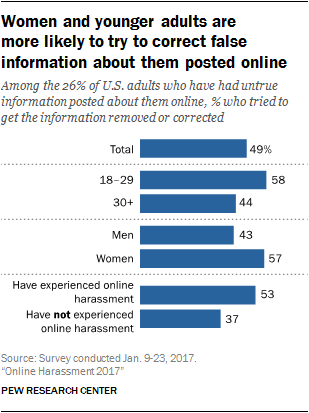
People who have had something untrue posted about them online are split over whether or not they tried to get that information taken down. Roughly half (49%) say they have made some effort to get false information about them corrected or removed, while a similar share (47%) say they have not.
Certain groups are more likely than others to try to address false information that gets posted about them. Women are more likely than men to attempt to have this sort of information taken down (57% vs. 43%), and younger adults are more active in this regard than are those ages 30 and older (58% vs. 44%). Meanwhile, about half (53%) of those who have encountered online harassment have attempted to take down untrue information about themselves when it is posted online, compared with 37% of those who have not been harassed online in the past.
When asked how successful they were in their efforts to remove or correct untrue information about them posted online, a majority (72%) of those who made the attempt say they ultimately succeeded. However, this group is divided between those who found the process of getting the information removed to be easy (39%) and those who found it difficult (33%). The remaining 28% of those who have tried to get untrue information about them removed were ultimately unsuccessful in their efforts.
Roughly one-in-ten Americans have experienced mental or emotional stress because something untrue was posted about them online
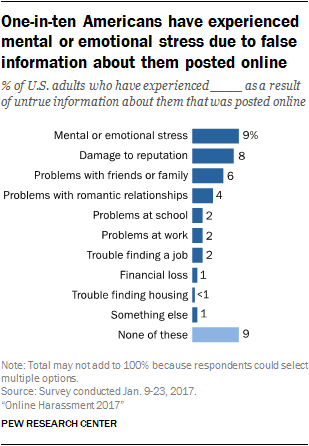
In some cases, finding untrue information about oneself posted online can take a significant toll. Some 9% of Americans (or 35% of those who have had untrue information posted about them online) have experienced mental or emotional stress as a result of this experience, while similar shares have experienced damage to their reputation (8%) or problems with their friends or family (6%). Others have experienced problems with romantic relationships (4%), problems at school (2%) or work (2%), or financial loss (1%) as a result of untrue information about them being posted online.
Younger adults – who, as noted above, are especially likely to encounter situations in which someone has posted untrue information about them online – experience many of these consequences at relatively high rates. Some 17% of 18- to 29-year-olds have experienced mental or emotional stress because something untrue about them was posted online (compared with 7% of those 30 and older). And comparatively large shares of young adults say that untrue information about them online has caused damage to their reputation (15%), problems with friends and family (12%), or problems with romantic relationships (11%).
Public awareness of some ‘emergent’ forms of online harassment is mixed
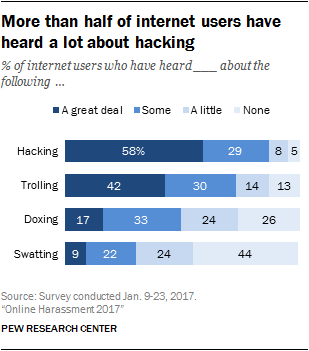
Beyond the other issues discussed in this report, the survey also asked about four “emergent” behaviors that have played a prominent role in recent public instances of online harassment. These include:
- Hacking – illegally accessing someone’s accounts to collect personal information or impersonate them
- Trolling – intentionally provoking or upsetting people online
- Doxing – posting someone’s personal information online without their consent
- Swatting – calling in a fake emergency so that the police will be sent to someone’s house
Internet users’ awareness of these emergent issues is relatively mixed. The vast majority of internet users (95%) have heard of hacking, with 58% having heard a great deal about it. Similarly, 86% have heard of trolling, with 42% having heard a great deal. Around one-in-five internet users have experienced these behaviors personally (18% each).
On the other hand, doxing and swatting are comparatively less-recognized. Some 73% of online adults have heard of doxing – but only 17% have heard a lot about this issue. In total, 3% of online adults report that they have been doxed. Meanwhile, 55% of internet users have heard of swatting, but only 9% have a great deal of familiarity with this issue.
As with many of the behaviors discussed in this chapter, these invasive experiences often go hand-in-hand with other forms of online harassment. Those who have been the targets of some form of online harassment are more likely than those with no harassment experiences to have been trolled (36% vs. 4%), hacked (22% vs. 14%) or doxed (6% vs. 1%).




